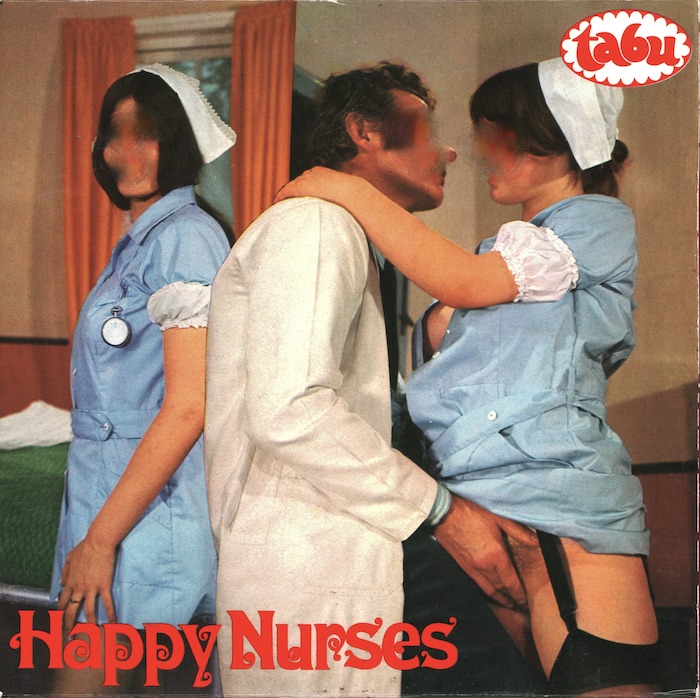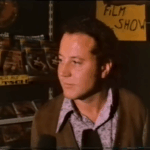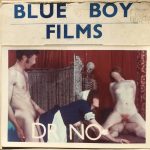It was not uncommon for Britain’s pornographers to produce hardcore films for the European market. Both George Harrison Marks, a renowned glamour photographer and filmmaker, and Scottish producer John Jesner Lindsay worked with European labels such as Germany’s Tabu and Denmark’s Color Climax Corporation. Lindsay often used his working for European distributors as an alibi to distance himself from the sale of his films in early 1970s Britain and evade obscenity convictions. In contrast, Harrison Marks appears to have sold hardcore variants of a number of softcore films distributed on his Maximus International label to Germany.
A film collector I interviewed for Under the Counter claimed to have enjoyed a Chinese meal with Harrison Marks in 1988. During which, Harrison Marks told the collector how an unnamed German producer who offered him money to make hardcore films in the early 1970s. Harrison Marks politely declined. The producer returned, placed a briefcase in front of him and “inside was £20,000”. This mysterious German producer was likely Walter Bartkowski, a Saxonian prisoner-of-war who later became a porn smuggler for Soho’s pornographers and eventually played a key part in building Germany’s hardcore porn market. His labels released several hardcore Harrison Marks films, including Happy Nurses, which was a uncensored version of the 1972 softcore film Goodnight Nurse.
A Director of Public Prosecutions file adds further credibility to the collector’s anecdote. It documents a police investigation into Marks’ transnational activities after his firm, Maximus International Limited, was raided in 1973. Police found “a number of 8mm films” on the softcore Maximus label, a further 14 “unprocessed 16mm colour films”, and a collection of photographic stills relating to the 16mm. On 27 November 1973, the Obscene Publications Squad interviewed Marks at Scotland Yard. Marks attempted to distance himself from Maximus International, saying that he was a “freelance producer and photographer making films for the company to distribute”, and it was his wife Toni and sister who were responsible for the running of the company. This arrangement distanced Harrison Marks from the company, especially if he was arrested. Harrison Marks was no stranger to obscenity trials. His first took place in 1964, where he was cleared for aiding and abetting the publication of obscene films, after a 14-year-old boy had answered an advert for Marks’ films in a photography magazine, receiving two mail-order catalogues in the post which were said to be obscene (The Times, 12 March 1964). Another had taken place in 1971, but the details for this are vague, and yet another in 1974, for similar charges faced in 1964 (Reading Evening Post, 24 April 1974).
Wanting to determine whether the seized films were obscene, the files shows that the police consulted with experienced obscenity law barrister Richard Du Cann:
Counsel is asked to advise whether in his view criminal proceedings can be instituted against HARRISON-MARKS in respect of:-
A .The 16 millimetre films alone or with the actors should the Police be able to trace them and,
B. The 8 millimetre films (if they are obscene) marketed by Maximus International Limited and MRS. HARRISON-MARKS and, if so, for what offence.
Investigators believed the 8mm films not to be obscene, as they showed simulated sex, but acknowledged that two films, Anna’s Manor (George Harrison Marks, 1970-73) and Vibrations (George Harrison Marks, 1970-73), were “more explicit”, or “near beer”:
VIBRATIONS
X appears for an interview to train as a ‘personal’ masseur. Training is mainly lesbian activities with Y including the use of vibrators and ‘Soixante neuf”,
X then visits her first client (Z) and puts the above training into practice, – including cunnilingus, (simulated?) After X leaves, Z admits Y and they start on the same sort of activity.”
The police showed greater interest in the 16mm films and stills. Prior to them being processed by the police, they asked Harrison Marks about their content. Marks said that they were part of “a venture unconnected with Maximus International Limited although he had the use of the studio’s equipment for the making of the films as part of this salary for the work done for the company”. It transpired that these were hardcore versions of Maximus titles.
FILM B
These girl tourists are visiting the Tower of London. The scenes include one of their [sic.] talking to a genuine Yeoman of the guard.
Two of the girls enter a dungeon. They pose for each other to take photographs in less and less clothes and as though ready for torture. Scenes of lesbian activity then follow, in the same position and on a table. They include cunnilingus.
They are surprised by two men dressed as Yeoman of the Guard who strip and join in. There follows sones of fellatio, cunnilingus, vaginal intercourse and ejaculation including detailed close-up shots.
Harrison Marks told the officers that “they were shot for the German market”, and were unprocessed as he was due to travel to Germany with the films, where they would be developed, edited and sold. He claimed that the performers used in the films were paid £50 a day, and the police note that they were sourced via a London modelling agency. Du Cann, acting as legal counsel for the police, assessed whether there was a case to answer under the Obscene Publications Act 1959. Du Cann was concerned by the extent to which an English jury could determine whether the publication of an article in Britain could deprave or corrupt a foreign audience. He concluded that this would not be possible, determining that Harrison Marks could not be prosecuted for the 16mm films under British obscenity law. He does point out that a charge of outraging public decency would be possible if “gross indecency” took place “between the men depicted or if there are any acts of buggery”, making Harrison Marks complicit in the acts and chargeable for aiding and abetting them.
The police were unable to prosecute Harrison Marks for the hardcore 16mm films. However, it seems that this investigation contributed to his 1974 trial, where he and his wife were indicted for sending indecent or obscene literature and films through the post. Harrison Marks later worked for the Theander Brothers’ Color Climax Corporation, producing the Super 8 titles Barmaid Pleasures (1978), Big ’n Busty (1978-79) and Arabian Nights (1979), among others. It is also possible that Harrison Marks’ fellow glamour film maker and publisher Russell Gay also produced hardcore versions of his softcore Mistral films for Bartkowski in the late 1970s. For example, Black Desire (1977-1980) appears in a hardcore version as Black Mystique (1977-80) on the label Tabu de Luxe. The British Girl Adult Film Database names ‘John Fortune’ as the director of the latter film, which could be a pseudonym used by Gay.







